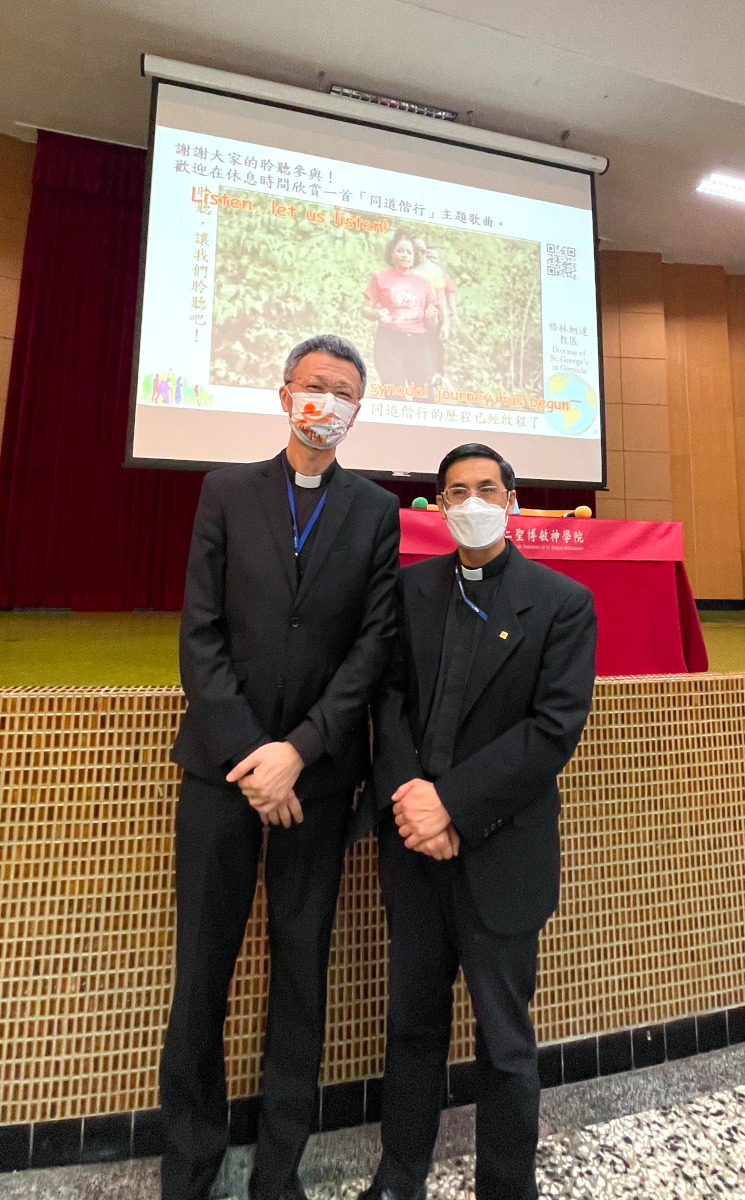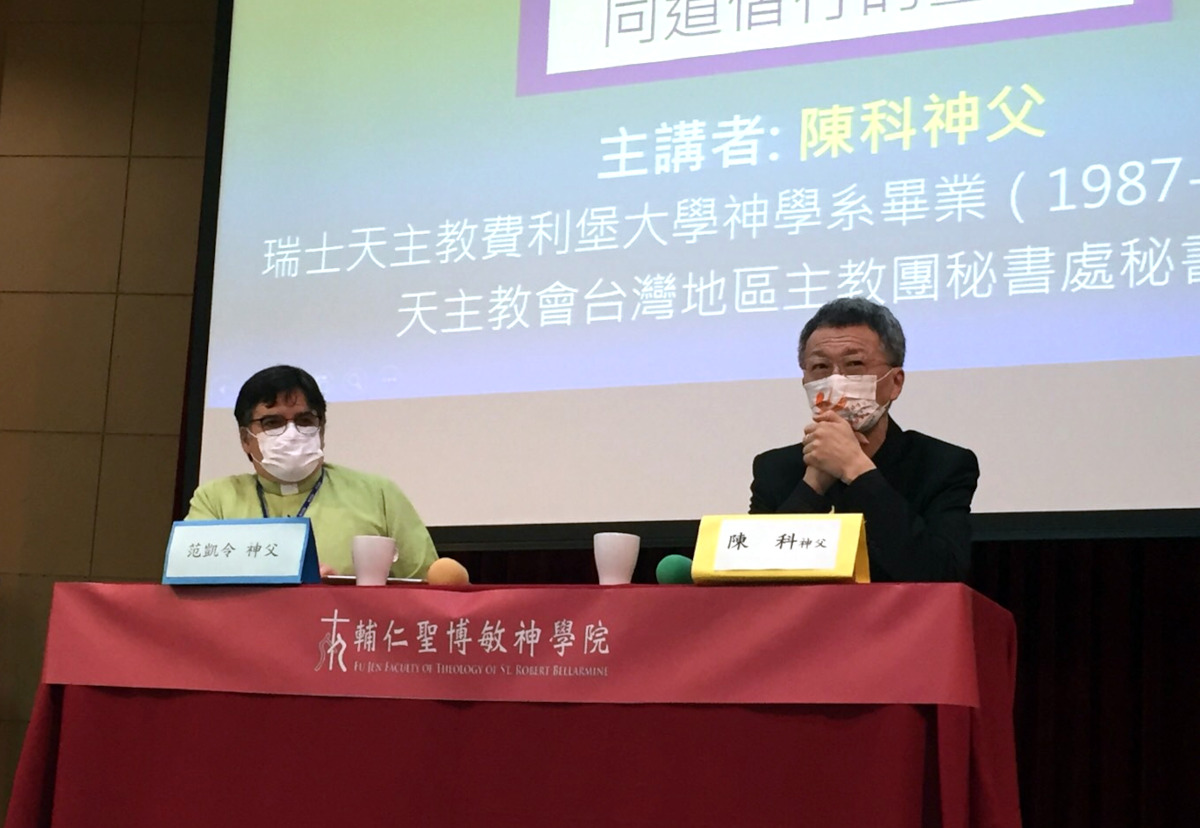"Fu Jen Faculty of Theology of St. Robert Bellarmine" and Chinese Ferdinand Verbiest Cultural Association" co-hosted the 4th Workshop in the Spirituality of Dialogue on May 28, 2022 (Saturday) - "For a Synodal Church: Communion, Participation and Mission" at the premises of St. Robert Bellarmine Faculty of Theology. After the opening prayer by Fr. Otfried Chan led, Fr. Jeffrey Chang SJ (Dean of St. Robert Bellarmine Faculty of Theology and Director of Master studies), and Prof. Chen Fang Zhong (Verbiest Cultural Association Chairman) delivered the opening speeches. The first part of the morning was led by Fr. Jeffrey Chang, with a lecture on the topic "A Synodal Church: United in Christ, Walking in the Spirit". From the perspective of Catholic theology, Father Chang described how we should respond to Pope Francis' call to actively participate as Christians with our whole heart, strength and mind in the church’s liturgy and daily life, in order to implement the reforms advocated by the Second Vatican Council.
The path of Synodality is God's expectation for the Church in the third millennium
After Fr. Jeffrey Chang, Fr. Otfried Chan, Secretary General of the Bishops' Conference of the Catholic Church in Taiwan, gave a lecture on "Synodal Spirituality". According to Fr. Chan, we are currently at a very singular moment in the history of the Church: it is the first time that a Universal Synod of Bishops has been planned to be prepared from the bottom up. Maybe we can't see the atmosphere in full swing yet, but putting our trust in the Holy Spirit will eventually lead us to unexpected results. The Synod of Bishops is a gift from God to the Church. Through this synodal assembly, Pope Francis is inviting the whole Church to reflect on a theme that is decisive for the life and mission of the Church: Synodality as the outlook for the Church of the third millennium. This process taps into the "renovation" proposed by the Second Vatican Council. It is a gift and a task: by walking together and reflecting on the process, the Church can recall her experience and discern how to live in communion, to involve all the faithful, and to uphold her mission with an open mind. In fact, Synodality (that is, walking together) is the most effective way to embody and demonstrate the Church's nature as both pilgrim and missionary (Preparatory Document 1). Therefore, this Synod of Bishops is not just an event held in each local Church across the world, but a process with a purpose, that is, to give every Catholic an opportunity to renew their faith through listening, reading, reflecting and sharing in different forums and with different people, so that their faith life is completely transformed by this Synod of Bishops.
 Identifying the voice of the Holy Spirit in the laity
Identifying the voice of the Holy Spirit in the laity
In the early days of church history, the humanity and divinity of Jesus Christ were questioned and opposed by different parties. Then, the ecumenical council was established to help to clarify the facts and protect the truth. Therefore, the main reason why the Pope convened the Synod of Bishops from the grassroots level was to distinguish the voice of the Holy Spirit coming from the laity, so that together with his brethren bishops at the Universal Synod they can discern what the Holy Spirit is saying to the whole Church. The relationship between the “Supernatural Sense of Faith” of the People of God (lay) and the “Magisterium” of the Church (Tradition) forms a dynamic that subsists as discernment of the content of the faith and communion of the universal Church; or we can also say that as innate character of the Church it subsists as consultation process, reflection and discussion, as well as the synodal decision-making. Incorporating both the faith sharing of the laity and the Magisterium, the church discerns the results of the input from the laity, and it becomes a renewed way of exercising the church’s magisterium. In the past, the issues to be discussed in the Synods of Bishops were decided by the Pope and the continental Conferences of Bishops. Under such circumstances, the content and vision of the continental bishops’ conferences could hardly encompass the Christian life of the entire people of God, nor could they reflect the current situation of the whole Church. At this synod of bishops, the Pope and the continental Conferences of Bishops want to listen first to the voices of all the people of God and, after discerning them, then decide on what are the issues to discuss. It is very important that each and every lay person joins in the consultation meetings at the diocesan level, as it manifests the openness to accept in the renewal process that the Holy Spirit is setting ahead for the Church.
Synodality traits: "Meet, Listen, Discern" The Pope used three verbs to denote “synodality” in his homily at the Synodal process inauguration Mass on October 17 last year: "meet, listen, discern". The purpose of this Synod is to enable all those who join it to participate in the communal process of the diocesan level, to dedicate time to meet the Lord and to create occasions to meet with one another; to listen to what the Holy Spirit has to say to the Church, to join others and listen to them, and use this as an opportunity to experience and transform ourselves, to become a "Synodal people" -people who journey together; to become a mature and authentic Christian able to be in communion with people of different ages, genders, cultural backgrounds, status, and even with people of other creeds.
A synodal Christian is someone who embodies faith, hope and love
In the final part of his presentation, Fr. Otfried Chan metioned that the pastoral care of parish priests in the present church is usually understood as solving the problems of the Christian life of the faithful, so that the faithful can live in peace. Although this is also the purpose of pastoral care, from the perspective of a synodal spirituality the pastoral care of the priest is more about leading the faithful to embody sacramental communion in their daily lives, so that the church can, through the participation, communion and mission of every believer, become a living testimony and manifest the sacramental mystery of the Church: God’s Trinity and God’s People becoming through the Holy Spirit -the love of God- one body in diversity. When we journey together as a Church, we are testifying that the love of Jesus Christ is inclusive, telling the world that we believe that Jesus Christ is God’s gift to mankind, sent for our salvation.
We are not called to "preach" to the baptized, but to be more humane than others: caring more for the weak, caring more for social good, speaking up with courage, being the conscience of society and the guardian of humanity and our common home, while helping the government and the people to shape a more just and fraternal society. Christians who practice the spirit of synodality are Christians who live out faith, hope, love, and put in action other virtues, becoming a living testimony of the resurrected Lord for everyone—no matter who they are, because those who are renewed in their faith and life will surely be eager to share their experiences with others and enjoy journeying with others as they share.
Video broadcast on YouTube platform
The video content of the session by Fr. Otfried Chan will be hosted on the “Voice of the Catholic Church” YouTube online platform on July 12 (Mandarin language). Readers are welcome to visit Verbiest Foundation website for the broadcast and other info.
The path of Synodality is God's expectation for the Church in the third millennium
After Fr. Jeffrey Chang, Fr. Otfried Chan, Secretary General of the Bishops' Conference of the Catholic Church in Taiwan, gave a lecture on "Synodal Spirituality". According to Fr. Chan, we are currently at a very singular moment in the history of the Church: it is the first time that a Universal Synod of Bishops has been planned to be prepared from the bottom up. Maybe we can't see the atmosphere in full swing yet, but putting our trust in the Holy Spirit will eventually lead us to unexpected results. The Synod of Bishops is a gift from God to the Church. Through this synodal assembly, Pope Francis is inviting the whole Church to reflect on a theme that is decisive for the life and mission of the Church: Synodality as the outlook for the Church of the third millennium. This process taps into the "renovation" proposed by the Second Vatican Council. It is a gift and a task: by walking together and reflecting on the process, the Church can recall her experience and discern how to live in communion, to involve all the faithful, and to uphold her mission with an open mind. In fact, Synodality (that is, walking together) is the most effective way to embody and demonstrate the Church's nature as both pilgrim and missionary (Preparatory Document 1). Therefore, this Synod of Bishops is not just an event held in each local Church across the world, but a process with a purpose, that is, to give every Catholic an opportunity to renew their faith through listening, reading, reflecting and sharing in different forums and with different people, so that their faith life is completely transformed by this Synod of Bishops.
 Identifying the voice of the Holy Spirit in the laity
Identifying the voice of the Holy Spirit in the laityIn the early days of church history, the humanity and divinity of Jesus Christ were questioned and opposed by different parties. Then, the ecumenical council was established to help to clarify the facts and protect the truth. Therefore, the main reason why the Pope convened the Synod of Bishops from the grassroots level was to distinguish the voice of the Holy Spirit coming from the laity, so that together with his brethren bishops at the Universal Synod they can discern what the Holy Spirit is saying to the whole Church. The relationship between the “Supernatural Sense of Faith” of the People of God (lay) and the “Magisterium” of the Church (Tradition) forms a dynamic that subsists as discernment of the content of the faith and communion of the universal Church; or we can also say that as innate character of the Church it subsists as consultation process, reflection and discussion, as well as the synodal decision-making. Incorporating both the faith sharing of the laity and the Magisterium, the church discerns the results of the input from the laity, and it becomes a renewed way of exercising the church’s magisterium. In the past, the issues to be discussed in the Synods of Bishops were decided by the Pope and the continental Conferences of Bishops. Under such circumstances, the content and vision of the continental bishops’ conferences could hardly encompass the Christian life of the entire people of God, nor could they reflect the current situation of the whole Church. At this synod of bishops, the Pope and the continental Conferences of Bishops want to listen first to the voices of all the people of God and, after discerning them, then decide on what are the issues to discuss. It is very important that each and every lay person joins in the consultation meetings at the diocesan level, as it manifests the openness to accept in the renewal process that the Holy Spirit is setting ahead for the Church.
Synodality traits: "Meet, Listen, Discern" The Pope used three verbs to denote “synodality” in his homily at the Synodal process inauguration Mass on October 17 last year: "meet, listen, discern". The purpose of this Synod is to enable all those who join it to participate in the communal process of the diocesan level, to dedicate time to meet the Lord and to create occasions to meet with one another; to listen to what the Holy Spirit has to say to the Church, to join others and listen to them, and use this as an opportunity to experience and transform ourselves, to become a "Synodal people" -people who journey together; to become a mature and authentic Christian able to be in communion with people of different ages, genders, cultural backgrounds, status, and even with people of other creeds.
A synodal Christian is someone who embodies faith, hope and love
In the final part of his presentation, Fr. Otfried Chan metioned that the pastoral care of parish priests in the present church is usually understood as solving the problems of the Christian life of the faithful, so that the faithful can live in peace. Although this is also the purpose of pastoral care, from the perspective of a synodal spirituality the pastoral care of the priest is more about leading the faithful to embody sacramental communion in their daily lives, so that the church can, through the participation, communion and mission of every believer, become a living testimony and manifest the sacramental mystery of the Church: God’s Trinity and God’s People becoming through the Holy Spirit -the love of God- one body in diversity. When we journey together as a Church, we are testifying that the love of Jesus Christ is inclusive, telling the world that we believe that Jesus Christ is God’s gift to mankind, sent for our salvation.

We are not called to "preach" to the baptized, but to be more humane than others: caring more for the weak, caring more for social good, speaking up with courage, being the conscience of society and the guardian of humanity and our common home, while helping the government and the people to shape a more just and fraternal society. Christians who practice the spirit of synodality are Christians who live out faith, hope, love, and put in action other virtues, becoming a living testimony of the resurrected Lord for everyone—no matter who they are, because those who are renewed in their faith and life will surely be eager to share their experiences with others and enjoy journeying with others as they share.
Video broadcast on YouTube platform
The video content of the session by Fr. Otfried Chan will be hosted on the “Voice of the Catholic Church” YouTube online platform on July 12 (Mandarin language). Readers are welcome to visit Verbiest Foundation website for the broadcast and other info.



